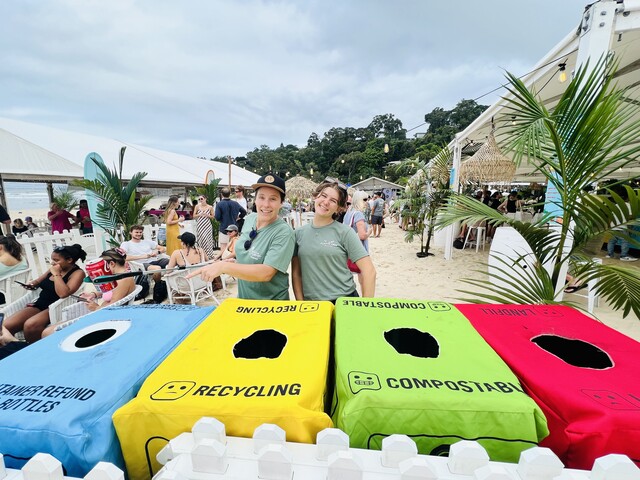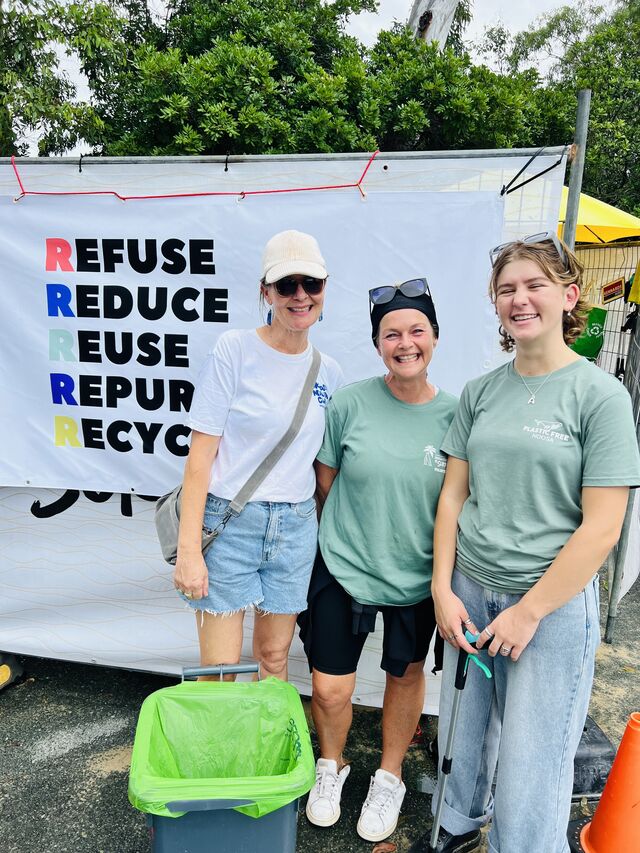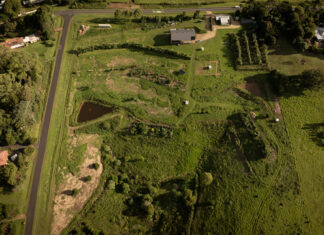The iconic Noosa Festival of Surfing returned for the 33rd year of food, drinks, music, art, events for everyone and, of course, incredible surfing.
Held in March, the Noosa Festival of Surfing festival provides a strong sense of community and connection for all competitors, volunteers, visitors, and locals as the beautiful Noosa Heads comes alive for the 10-day festival.
This is not only the largest amateur surf contest in the world, but a Plastic Free Noosa Champion Event proving the possibilities for sustainable tourism.
The sustainability initiatives of events in Noosa, such as the Noosa Festival of Surfing, are leading examples of the possibilities for environmentally-conscious events.
The festival is assessed under Tourism Noosa’s Sustainable Event Criteria which aligns with the Global Sustainable Tourism Criteria.
The sustainability efforts reflect the values of the Noosa region as people come from all over the world to celebrate the beautiful ecosystems and surf breaks that Noosa has to offer.
Sustainability officer Amanda Pummer is at the forefront of the progressive environmental conservation work and shares her insights into the sustainability initiatives of the festival.
“Six years ago the event did not have a sustainability vision,“ she said.
“We created our sustainability pledge, which talks about the impact of this event in this space. The fact that it’s a world surfing reserve means that it has incredible value, not only to the surfing culture, but to local residents and businesses and to tourism. The policy addresses what risk we have as an event both in and out of the water, and what we do to mitigate that risk.”
The environmental impact of the event is measured every year by the three indicators of waste, water, and energy.
Not only is this event going Zero Waste, but carbon emission reduction strategies have been implemented and the selected event partners further reflect the festivals’ commitment to sustainability.
The journey to reduce the events’ carbon emissions began two years ago by calculating event data and surveying how people were traveling to the festival, revealing the large amount of unavoidable transport emissions.
Amanda recalls, “It was really easy to see after two years of reducing our event operation emissions, that more than 85 per cent of the carbon emissions was transport. We started focusing on what we can do about that. With unavoidable emissions we started looking around for carbon offsets. We decided to use a voluntary carbon offset scheme which was Sea Trees, and they are amazing. They resonate with surfing culture because they are blue carbon focused.”
The Noosa Festival of Surfing 2024 was certified with Climate Active as a Carbon Neutral event.
“With the sponsorship of our major sustainability partner, Ecovantage, we offset 250t Co2e- pre-event and 100 per cent VCU credits offset with Seatrees which will plant 750 mangrove trees in Mida Creek, Kenya which has the potential to sequester an additional 250t of CO2. With these additional offsets as well as the voluntary support for local reforestation program Trees for Tourism, the Noosa Festival of Surfing aims to be a Carbon Positive event.“
Waste management is another large aspect of reducing the environmental impact of the festival, which has seen a large improvement from 46 per cent in 2019 to 73 per cent in 2024 in waste diversion. The waste management program consists of four bins ‘front of house’ for public use (comingled recycling, composting, containers for change, and landfill) and an additional three waste streams back of house at the waste station (soft plastics, cardboard, and polystyrene collected during bump-in), which are used to minimise contamination and maximise the waste diverted from landfill.
The Waste Warrior volunteers are committed to minimising the waste going to landfill or polluting the beaches every day of the festival and assisting members of the public in learning how to dispose of their waste correctly.
Amanda expresses the importance of community action and the benefits of taking part in volunteer programs at events such as this.
“We couldn’t do it without volunteers, the volunteers are passionate and purpose driven and so I suppose that’s the antidote to eco-anxiety – is actually taking action in whatever resonates with you,” she said.
In the coming years, Amanda envisions how they can make even more progress to further reduce the impact of the Noosa Festival of Surfing.
This year, 120kg (6 x 240L bins) of disposable paper coffee and cocktail cups were diverted from landfill over four days thanks to the generous trial support of paper cup recycling program, Simply Cups.
The goal for next year is to have the jumbo cup Simply Cup stations placed along the foreshore for the entire festival to recycle these disposable cups that are detrimental to the environment.
Additionally, training and familiarising the staff at the going Zero Waste Bar with waste management procedures proves a challenge, but likewise is identified as a great opportunity to create behavior change and education in the hospitality sector and broader community.
Education and awareness are critical in community action, as we work together to reduce our individual and community impact on local ecosystems.
The local environmental issues we encounter, from disposable coffee cups to food waste, stem from systemic issues which often seem overwhelming and create feelings of helplessness or despair.
As we work to ensure our actions, culture and community have a positive impact, we are reminded that it is critical to remember that “We can only control those things that are within our sphere of influence.”
Taking action for environmental conservation is undeniably critical, not only in the tourism space, but in our community.
With such an abundance of passion and opportunities, it cannot be emphasised enough how important our relationship with the environment is.
“We cannot use the fixed resources of our planet as if they’re going to be here forever. We need to think as futurists. We need to understand the environmental science and the fact that climate change will make the planet unliveable within about 120 years, and that’s our grandkids, so it’s that tangible. The only thing you can do wrong is not act.”
Join as a volunteer at upcoming Plastic Free Noosa events and be a part of the plastic free movement.
For businesses, events, or individuals ready to take the next step for a plastic free future, learn how you can get involved at plasticfreenoosa.org/join-now









